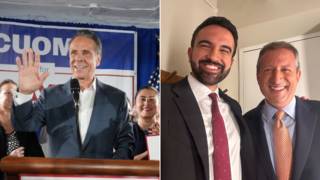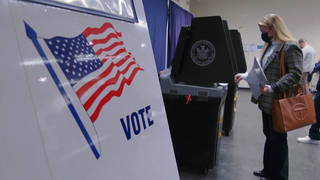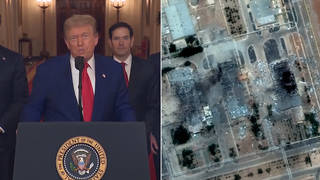
Guests
- Alistair KitchenAustralian writer who was denied entry to the United States and deported because of his writing about Columbia University student protests.
A Columbia University graduate has been denied entry into the United States and deported following 12 hours of detention at the Los Angeles International Airport. Australian writer Alistair Kitchen says agents questioned him about his views on Israel and Palestine and downloaded the contents of his phone. “They were waiting for me when I got off the plane. I didn’t even make it into the queue for passport processing,” says Kitchen. “Customs and Border Protection are using the immense power and discretion that they have to search and then to deny entry… because they disagree with some people’s speech.”
Transcript
AMY GOODMAN: This is Democracy Now!, democracynow.org. I’m Amy Goodman. An Australian writer was recently detained for some 15 hours then deported from a U.S. airport for his writings about pro-Palestine protests at Columbia University. Alistair Kitchen was detained by border agents after he’d flown from Melbourne, Australia to Los Angeles. He reports a border agent told him, quote, “Look, we both know why you’re here.” When Kitchen said he didn’t know why, the agent reportedly said, quote, “It’s because of what you wrote online about the protests at Columbia University.” Alistair had graduated from a master’s program at Columbia last year when the protests against Israel’s war on Gaza began. He’d written about the student encampments on his Substack page. PEN America said Kitchen’s detention and deportation was, quote, “Gravely concerning.” Jonathan Friedman of PEN America said, quote, “Kitchen’s account fits a disturbing pattern in which border agents appear to be screening visitors to the U.S. for their viewpoints. That is anti-democratic, and it must be halted,” unquote. We go now to Australia, where we’re joined by Alistair Kitchen. The New Yorker magazine published an account of what happened in a piece headlined, “How My Reporting on the Columbia Protests Led to my Deportation.” Alistair, thanks so much for staying up late to talk to us. Tell us, the day this all happened, where you were and just what took place.
ALISTAIR KITCHEN: Well, I had flown 15 hours all the way to LAX, and frankly, I was prepared for something to go wrong. There’s been plenty of media here in Australia about tourists getting detained at U.S. airports for all range of reasons. I’ve written about the protests, and I’ve written critically about the Trump administration, so I went ahead and scrubbed my phone, scrubbed my social media feed. But just as I got to get into the passport queue for my ESTA, my visa waiver, I was detained and interrogated and told that the reason was, as you say, what I had written online.
AMY GOODMAN: So, explain what happened. You come off your plane. And were people waiting for you there?
ALISTAIR KITCHEN: Yeah, this is crucial. They were waiting for me when I got off the plane. I didn’t even make it into the queue for passport processing. Instead, the intercom went over the loudspeaker, and my name was called. I was asked to meet an officer at the back of the room, and he immediately took me away, immediately asked for my phone and then immediately asked for the passcode of that phone. I said, “I’d rather not hand over my passcode.” He said, “That’s fine, we will immediately deny you entry and deport you.” And that’s when I made the wrong choice to hand over the passcode to my phone, believing wrongly and hoping wrongly that they would see that I’m a writer, that I was writing about the protests in the capacity as a journalist, and that I certainly posed no threat to the country and that I have many loved ones in the U.S.
AMY GOODMAN: Well, describe the scene, where you were brought to, who else was there, both detainees like you, how long they’d been there. And then, the questioning took place over hours, is that right?
ALISTAIR KITCHEN: Yeah, that’s right. I was first taken to this back room. I was sat down. The questioning began immediately with this opening gambit about Israel and Palestine. I was asked questions about what my thoughts were on the conflict, how I would solve it, do I know any Jews, do I know any Muslims? I was asked to hand over the names of students, student groups I was involved with, WhatsApp groups with other protestors, all of which I refused to do. And then, after some time, after he was satisfied, he then began the process of downloading the contents of my phone. He went away, disappeared for some time, came back out and that was when I really knew I was in trouble because he said to me, “Mr. Kitchen, we’ve found evidence on your phone of prior drug use. On your ESTA visa waiver form, you represented to us that you had not consumed drugs before. That misrepresentation is grounds for denial of entry and deportation.” That was maybe one to two hours in of a 12-hour process. I was interviewed at that point, I was interviewed again maybe six hours later in a Groundhog Day moment where all of the same questions were asked. And in the meantime, I was held in a detention room with – there were five women in there. I was the only man when I arrived.
AMY GOODMAN: Can I just interrupt on the issue of drugs? In New York State, you can consume marijuana. Can you explain what they were talking about?
ALISTAIR KITCHEN: Yeah, so I’d previously – they identified that I had consumed, and I admitted to having bought, marijuana in New York state. This is very important for any international listeners of yours. If you buy marijuana in California, in New York, you are doing so legally by state law, but you’re doing so illegally by federal law. And therefore, in the eyes of Customs and Border Protection, you are breaking the law, and you’re misrepresenting your behavior when you said that you haven’t consumed illicit drugs.
AMY GOODMAN: So, if you can respond to what the U.S. government is now saying to various media outlets. A spokesperson for the U.S. Department of Homeland Security said, “Using the ESTA is a privilege, not a right, and only those who respect our laws and follow the proper procedures will be welcomed.” And they denied that DHS said that – they denied that they were targeting you for your political beliefs. That seems to run counter to what you were told when you were being interrogated. And tell us, how much into the conversation, into the interrogation you were questions and what the agent said to you about your political writing?
ALISTAIR KITCHEN: Yeah, it’s contrary explicitly to what they told me as soon as I arrived. And to this extent, I’m lucky. I’m lucky that they were so forthcoming in the moment and so brazen as to say, “Look, we both know why you’re here. It’s because of what you’ve written online. I’m going to interrogate you now about what you’ve written online.” Now, the DHS now wants to come out and deny that. Of course they do. And of course, they want to focus on the drug case as grounds for deportation. I’m not disputing that at all. Of course, what I’m here to say is that Customs and Border Protection are using the immense power and discretion they have to search and then to deny entry under politically motivated grounds and politically motivated reasons. They’re doing so clearly and explicitly in their own words because they disagree with some people’s speech. They didn’t like what I said, so they went looking for a reason to deport me.
AMY GOODMAN: So, your final takeaway from this detention and deportation, what you felt you would warn people about.
ALISTAIR KITCHEN: Yeah, the first is, this might sound severe, but if you don’t have a great reason to go to the United States, and you’re a tourist, this might not be the time. The second is that if you have anything sensitive on that phone, do not take that phone. Take a burner phone, buy it early populate it with some content so that it doesn’t look suspicious. And the third thing is, if all that fails, and you end up in the position that I was in, and you were offered, after getting off a 15-hour flight, a choice between deportation and having your phone searched and downloaded, my view is accept immediate deportation. Spend the 12 hours in detention and go home. Because by the time they’re ready to look through your phone, they’re never going to let you in anyway.
AMY GOODMAN: Alistair Kitchen, I thank you for being with us. Australian writer deported last week. Wrote about his experience for The New Yorker in a piece headlined, “How My Reporting on the Columbia Protests Led to My Deportation.” We will link to it at democracynow.org.













Media Options